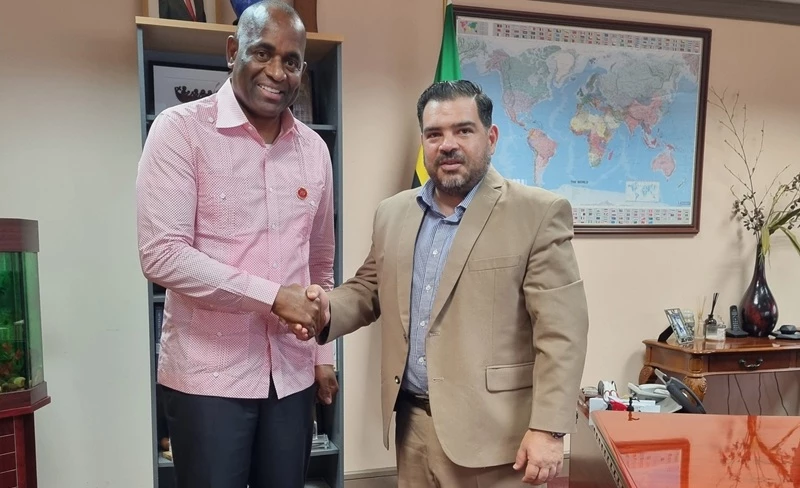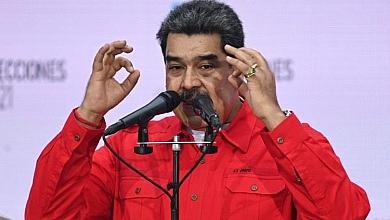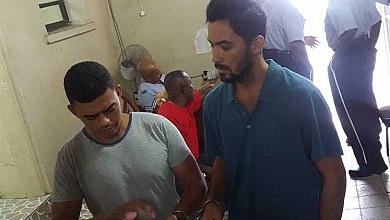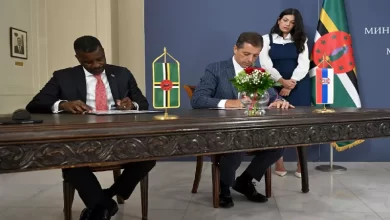Dominica Reaffirms Support for Venezuela Following Controversial Elections

The government of Dominica has issued a public statement reaffirming its support for President Nicolás Maduro and the Venezuelan government following regional and parliamentary elections held in the South American country. In its official declaration, Dominica offered “congratulations” on what it described as a victorious electoral outcome and pledged continued solidarity with Venezuela on key regional initiatives.
According to the statement, Dominica “remains a steadfast friend and partner of Venezuela”, emphasizing historical and ongoing cooperation under frameworks such as ALBA (the Bolivarian Alliance for the Peoples of Our America) and PetroCaribe, two regional alliances through which Venezuela has extended economic support to Caribbean states.
The statement also highlighted Dominica’s commitment to advancing “social justice and sustainable development” through bilateral collaboration, suggesting that ties between the two nations go beyond diplomacy and are rooted in mutual assistance and shared regional goals. It closed by affirming hopes for even deeper cooperation in the future.
Maduro’s administration reportedly received close to 83% of the vote, but the election was boycotted by opposition parties in Venezuela, raising widespread concerns among international observers. Critics have questioned the legitimacy of the vote, pointing to a pattern of contested elections in the country, ongoing humanitarian crises, and sanctions imposed by several Western governments.
Nevertheless, Dominica’s firm position signals not only diplomatic loyalty but also continuity in foreign policy, particularly regarding its alignment with socialist-leaning regional powers. Venezuela has historically provided Dominica with concessionary fuel arrangements, direct aid, and support for infrastructure under programs tied to PetroCaribe.
The timing of the announcement comes as Venezuela continues to face political and economic isolation from Western institutions. For Dominica, however, the relationship appears rooted in history, mutual support, and a pragmatic embrace of South-South cooperation.
This article is copyright © 2025 DOM767









The Government of Dominica has made a habit of cozying up to authoritarian regimes, not just Venezuela under Nicolás Maduro, but also China, a global superpower with one of the most tightly controlled one-party dictatorships in the world.
While Dominica congratulates Maduro on a rigged election and praises “social justice” in Venezuela, it is also deepening ties with the Chinese Communist Party, whose record includes mass surveillance, suppression of free speech, censorship, forced labor, and the imprisonment of political dissidents and ethnic minorities. This is not a coincidence, it is a pattern.
Why does Dominica prefer dictators? Because they do not ask hard questions. China funds infrastructure projects, stadiums, bridges, hospitals, and provides “development aid” that comes with political loyalty, not transparency or accountability. It is a relationship that allows Dominica’s government to sidestep Western scrutiny and avoid conditions that might require actual reforms, human rights protections, or anti-corruption measures.
It is the same reason they stand with Venezuela, these deals benefit the government, not the people. Cheap oil from PetroCaribe, no-interest loans from China, and big flashy projects look good in headlines but do little to improve wages, lower living costs, or build a truly independent economy. Meanwhile, Dominicans are kept in the dark about the real terms of these deals, their long-term debt consequences, and who is profiting behind the scenes.
This government is not building partnerships, it is buying silence and political survival. The people of Dominica deserve relationships based on democracy, transparency, and mutual respect, not secret deals with dictatorships.
The Government of Dominica has made a dangerous habit of aligning itself with authoritarian regimes. These are not alliances built on shared democratic values or people centered development, they are strategic partnerships between governments that prioritize control, secrecy, and political survival over transparency, freedom, and accountability.
Venezuela, under Maduro, has crushed dissent, jailed opposition leaders, and turned elections into formalities. China censors its citizens, surveils its population, and punishes free thought with brutal efficiency. Yet these are the governments Skerrit proudly stands beside.
Why? Because dictators do not demand accountability. They offer loans, aid, and high-profile infrastructure projects, all without requiring anti-corruption measures, human rights protections, or real reforms. In return, Dominica offers political loyalty and silence, even when its partners are committing atrocities.
But let us be clear, these relationships benefit the government, not the people of Dominica. They help keep those in power exactly where they are, while the rest of the country struggles with low wages, poor healthcare, a weak economy, and growing inequality.
And if this does not stop now, if Dominica continues down this path, we are looking at more than just arresting protesters or silencing opposition voices. We are watching the slow and deliberate shift toward dictatorship. Human rights violations will only increase. Censorship will expand. Political intimidation will escalate. What is happening in Venezuela today could very well be Dominica tomorrow.
There is a saying: “Show me your friends, and I will show you what you are about.” With friends like Maduro and the Chinese Communist Party, it is clearer than ever what kind of government we are dealing with and where they are taking our country!
So it’s okay for Dominica to have ties with the UK, which invaded Iraq and sold arms globally, but not China? Every country acts in its own interest. If China builds bridges and gives scholarships, why reject it just to please Western critics?
It is honestly disappointing that you do not seem to understand the consequences of dealing with dictators. This is not just a matter of opinion or politics, it is about enabling regimes that suppress freedoms, silence dissent, and often brutalize their own people. When you defend or excuse this kind of behavior, whether knowingly or out of ignorance, you become part of the problem.
People have a responsibility to inform themselves, to look beyond propaganda, and to hold their governments accountable for the alliances they make and the actions they take. Blind patriotism or willful ignorance does not absolve anyone of that duty. Defending governments that align themselves with authoritarian regimes without questioning their motives or the long-term damage they are doing to democracy, human rights, and global stability is not only naïve, it is dangerous.
Wake up. Understand what is really happening before you defend it. Show me your friends and I will show you what you are about.
I voted for Skerrit because he delivers. Talk is cheap, but development is not. Let the man lead.
It is important that all voices are heard in this conversation. You say you voted for Skerrit because he delivers, and I respect that. Every voter has their reasons, and if you have personally seen improvements in your community, whether that’s new infrastructure, better roads, housing projects, or access to services, then your vote reflects your experience. That said, development must be measured not just by what is built, but who benefits, how it is paid for, and whether it empowers people or creates dependence.
Let us be honest: yes, under Skerrit’s leadership, there have been visible development projects, but they often come with serious questions. Where is the transparency? Who gets the contracts? Are these projects sustainable, or just politically timed ribbon cutting ceremonies? Dominica has received hundreds of millions through the Citizenship by Investment (CBI) program, but where is the full, audited breakdown of how that money was spent? Can the average citizen go online and verify where these public funds went? Has it reduced poverty or just deepened inequality between the politically connected and the rest?
And let us not forget the bigger picture. Despite the development you mention, Dominica still struggles with, high unemployment,, crippling cost of living, dependence on foreign consultants and contractors, lack of press freedom and fear of political retaliation, no real electoral reform, despite promises.
So yes — “talk is cheap,” but propaganda is expensive. And development that silences critics, centralizes power, and excludes half the population from decision making is not real progress, it is control dressed up as leadership.
If Skerrit is truly delivering, then let him stand on a fully transparent record. Let the contracts be public. Let media be free. Let the electoral process be fair. Let the opposition have equal access to funding and airtime. Let Dominicans abroad vote. Let the people verify, not just believe. Because real leadership welcomes scrutiny, it does not hide behind slogans and stage-managed events.
If you’re proud of what you voted for, that is your right. But many Dominicans are still waiting for their roads, their jobs, their justice, and their voice in a democracy that works for everyone, not just the well-connected few.
Foreign policy isn’t about picking saints, it’s about choosing partners who help your country move forward. Dominica’s relationship with China and Venezuela is grounded in development priorities, not ideology.
When roads are built, scholarships are offered, and infrastructure is improved, ordinary Dominicans benefit. We cannot afford to wait for perfect partners. Western nations often tie their aid to political interference, austerity, and IMF conditions that cripple small economies like ours.
China offers financing with fewer strings, and Venezuela’s support through PetroCaribe reduced our energy burden for years. These partnerships are not about dictatorship, they are about opportunity. Our government has chosen pragmatic engagement, and it’s producing tangible results. Critics can theorize from abroad, but on the ground, people want jobs, stability, and progress.
If China or Venezuela helps us get there, then why not? In a competitive world, Dominica must act in its own interest, not according to foreign ideological demands.
Did it ever occur to anyone that maybe this government is not just partnering with dictators for loans and infrastructure, maybe they are learning from them? When a small democratic nation repeatedly aligns itself with authoritarian regimes like China and Venezuela, it is not just about economics anymore, it starts to look like a political apprenticeship.
We should all be asking what exactly is this government learning from its “friends”? How to silence opposition? How to concentrate power? How to manipulate elections and control the media? These are the tactics of the regimes Dominica is embracing, and history has shown us that this kind of influence is not just financial, it is ideological.
A government that refuses to build local businesses, avoids transparency, crushes dissent, and becomes addicted to foreign handouts is already showing signs of authoritarian drift. And if they are getting comfortable taking money from dictators, maybe it is because they see a future for themselves that looks a lot like those regimes.
So yes, it is time Dominicans start asking harder questions. Is our leadership preparing us for prosperity or preparing themselves for permanent power?